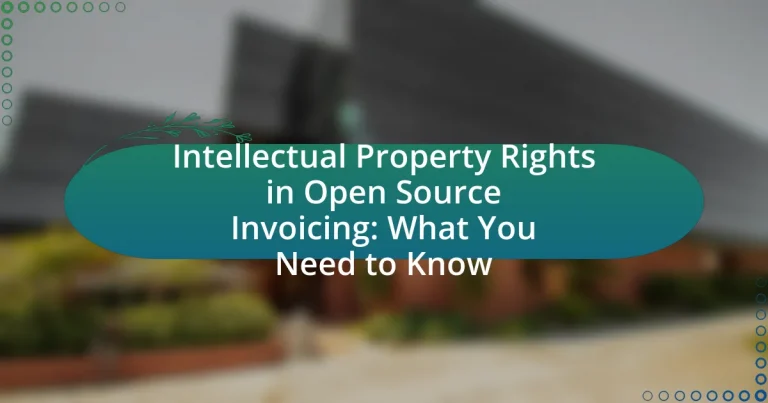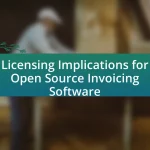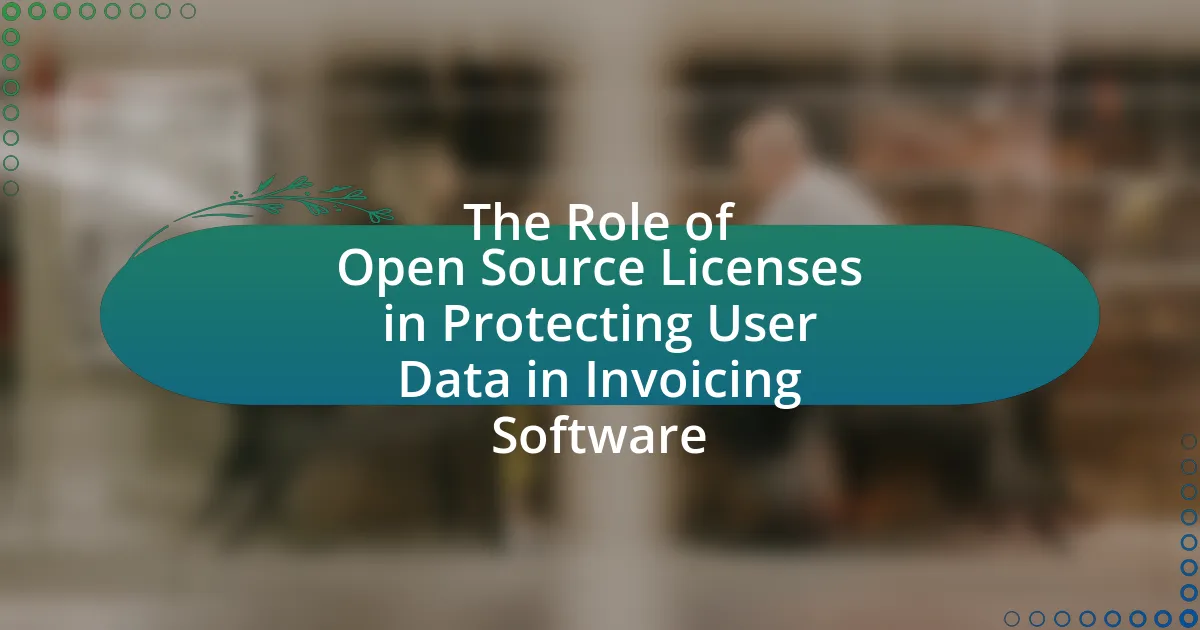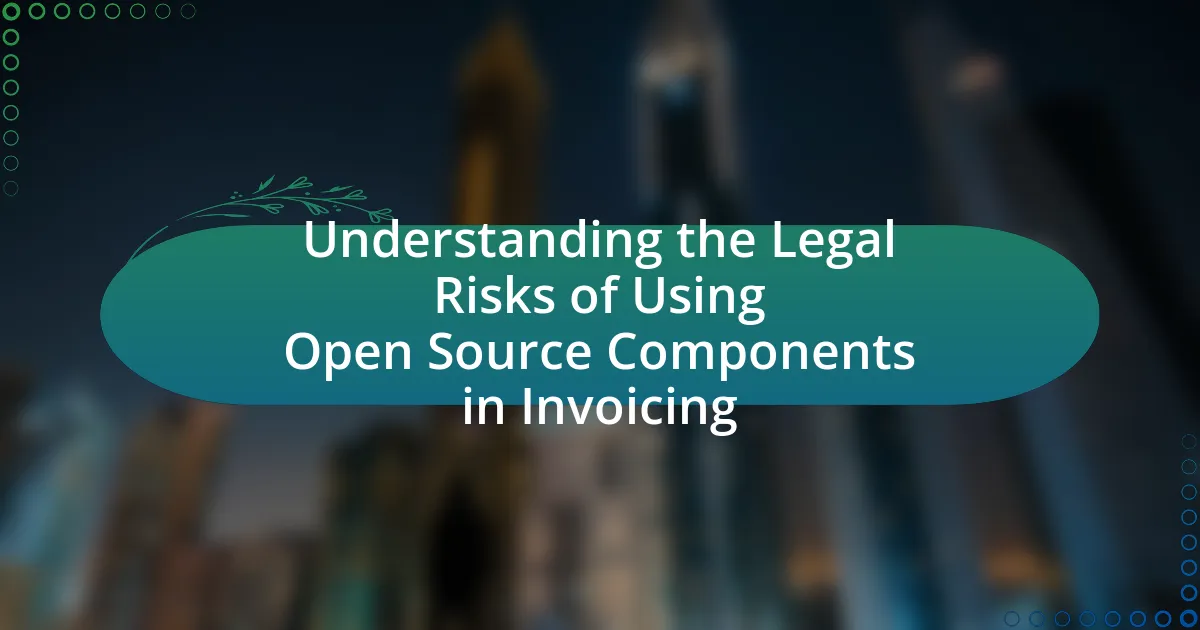Intellectual Property Rights (IPR) in Open Source Invoicing encompass the legal protections that govern the use, distribution, and modification of open source software designed for invoicing. This article outlines how IPR applies to open source software, detailing relevant types such as copyright, trademarks, and patents, and their significance in protecting both developers and users. It also examines the implications of various open source licenses, the challenges developers face regarding IPR, and the importance of compliance to foster innovation and collaboration within the open source community. Additionally, it provides practical tips for developers to navigate IPR effectively and highlights resources for ongoing education and support in this area.
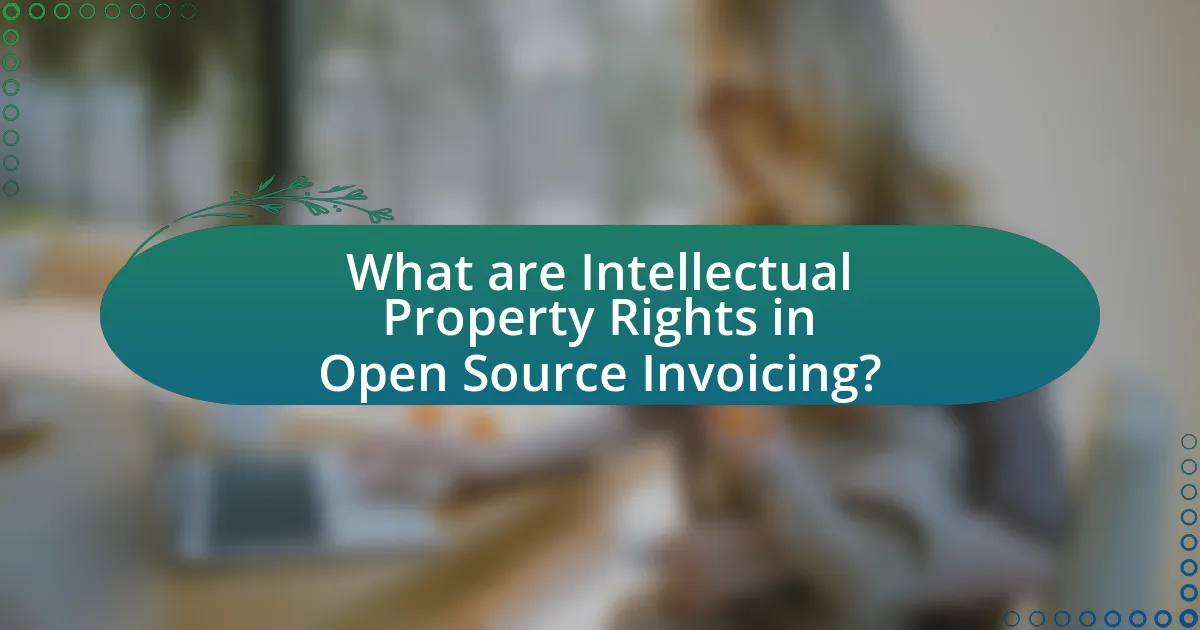
What are Intellectual Property Rights in Open Source Invoicing?
Intellectual Property Rights (IPR) in Open Source Invoicing refer to the legal protections that govern the use, distribution, and modification of open source software used for invoicing purposes. These rights ensure that creators can maintain control over their intellectual contributions while allowing users to freely access and utilize the software under specific licensing agreements. For example, licenses like the GNU General Public License (GPL) or the MIT License outline the terms under which the software can be used, modified, and shared, thereby balancing the interests of developers and users.
How do Intellectual Property Rights apply to open source software?
Intellectual Property Rights (IPR) apply to open source software by allowing developers to retain certain rights while permitting others to use, modify, and distribute their software under specified conditions. Open source licenses, such as the GNU General Public License (GPL) or the MIT License, explicitly define how the software can be used and shared, ensuring that the original authors maintain some control over their intellectual property. For instance, the GPL requires that any derivative works also be distributed under the same license, thereby protecting the original creator’s rights while promoting collaboration and innovation within the open source community.
What types of Intellectual Property Rights are relevant in this context?
The types of Intellectual Property Rights relevant in the context of open source invoicing include copyright, trademarks, and patents. Copyright protects the original code and documentation created for the invoicing software, ensuring that the authors retain rights over their work. Trademarks safeguard the brand identity associated with the invoicing software, preventing unauthorized use of logos and names. Patents may apply if the invoicing software includes novel technological processes or methods, granting exclusive rights to the inventor. These rights collectively ensure that creators can protect their innovations while contributing to the open-source community.
How do these rights protect developers and users?
Intellectual property rights protect developers and users by ensuring that creators can control the use of their work while providing users with legal access to software. These rights prevent unauthorized copying, distribution, and modification of software, which safeguards developers’ investments in time and resources. For instance, copyright laws grant developers exclusive rights to their code, allowing them to monetize their creations and incentivize innovation. Simultaneously, users benefit from these rights as they can rely on the legitimacy of the software they use, knowing it is protected from piracy and misuse. This legal framework fosters a secure environment for both parties, promoting collaboration and trust within the open-source community.
Why are Intellectual Property Rights important for open source invoicing?
Intellectual Property Rights (IPR) are crucial for open source invoicing because they protect the innovations and contributions of developers while allowing for collaborative improvement. IPR ensures that creators can maintain control over their work, preventing unauthorized use or exploitation, which fosters a sustainable environment for open source projects. For instance, the GNU General Public License (GPL) provides a legal framework that allows developers to share their software while ensuring that any derivative works remain open source, thus promoting continuous innovation and collaboration. This legal protection encourages more developers to contribute to open source invoicing systems, knowing their rights are safeguarded.
What risks do developers face without proper rights?
Developers face significant legal and financial risks without proper intellectual property rights. Without these rights, developers may inadvertently infringe on existing patents, copyrights, or trademarks, leading to potential lawsuits and costly settlements. For instance, a study by the Software Freedom Law Center indicates that developers lacking clear rights can face legal actions that may result in damages exceeding millions of dollars. Additionally, the absence of proper rights can hinder a developer’s ability to monetize their work, as they may not be able to enforce their ownership or control over the software, ultimately impacting their revenue and career prospects.
How do these rights influence innovation in open source invoicing?
Intellectual property rights significantly influence innovation in open source invoicing by providing a legal framework that encourages collaboration and sharing of ideas. These rights protect the contributions of developers, ensuring that their work can be freely used and modified while still giving them recognition and potential financial benefits. For instance, the GNU General Public License (GPL) allows developers to build upon existing software, fostering an environment where improvements and new features can be rapidly developed. This collaborative approach has led to the creation of robust open source invoicing solutions, such as Invoice Ninja and Odoo, which have gained popularity due to their flexibility and community-driven enhancements. Thus, intellectual property rights not only safeguard individual contributions but also stimulate collective innovation in the open source invoicing sector.
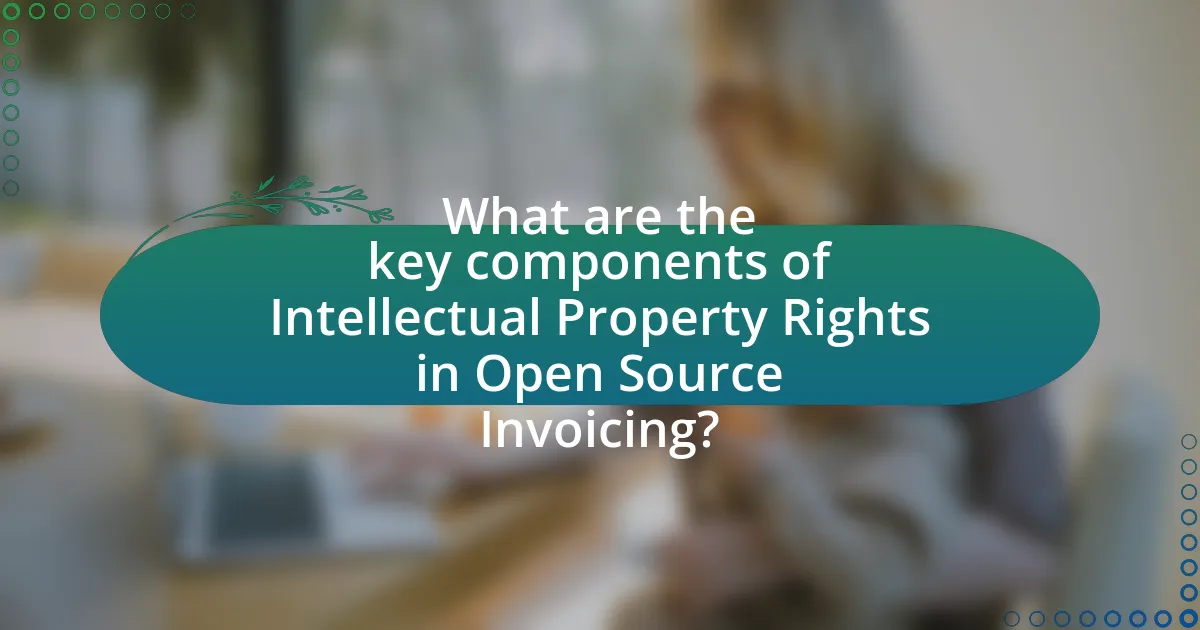
What are the key components of Intellectual Property Rights in Open Source Invoicing?
The key components of Intellectual Property Rights in Open Source Invoicing include copyright, licensing, trademarks, and patents. Copyright protects the original code and documentation of the invoicing software, ensuring that creators maintain control over their work. Licensing defines how the software can be used, modified, and distributed, with common licenses like GPL and MIT providing specific terms. Trademarks protect the branding associated with the invoicing software, preventing unauthorized use of names and logos. Patents may apply to unique algorithms or processes within the software, granting exclusive rights to the inventor. These components collectively ensure that the rights of creators and users are balanced in the open-source ecosystem.
What licenses govern open source invoicing software?
Open source invoicing software is primarily governed by licenses such as the GNU General Public License (GPL), MIT License, and Apache License. These licenses dictate how the software can be used, modified, and distributed. For instance, the GPL requires that any derivative work also be open source, while the MIT License allows for more permissive use, including proprietary applications. The Apache License includes provisions for patent rights, ensuring that contributors cannot sue users for patent infringement related to the software. These licenses are widely recognized and provide a legal framework that supports collaboration and innovation in open source software development.
How do different licenses affect user rights and obligations?
Different licenses significantly affect user rights and obligations by defining how software can be used, modified, and distributed. For instance, permissive licenses like the MIT License allow users to freely use, modify, and distribute the software with minimal restrictions, promoting wide adoption and collaboration. In contrast, copyleft licenses such as the GNU General Public License (GPL) require that any modified versions of the software also be distributed under the same license, ensuring that the same freedoms are preserved for all users. This creates an obligation for users who modify the software to share their changes, thereby fostering a community of sharing and improvement. The specific terms of each license dictate the extent of user rights, such as whether commercial use is permitted or if attribution is required, thus shaping the legal landscape of software use and development.
What are the implications of using proprietary versus open source licenses?
Using proprietary licenses restricts access and modification of software, while open source licenses promote collaboration and transparency. Proprietary licenses typically limit user rights, requiring payment for use and restricting redistribution, which can lead to vendor lock-in and reduced innovation. In contrast, open source licenses allow users to modify and share software freely, fostering community-driven development and rapid iteration. For example, the GNU General Public License (GPL) ensures that software remains free and open, encouraging contributions from a global developer community. This difference in access and modification rights significantly impacts software development, user autonomy, and market dynamics.
How can developers ensure compliance with Intellectual Property Rights?
Developers can ensure compliance with Intellectual Property Rights by conducting thorough research on existing patents, copyrights, and trademarks relevant to their work. This involves reviewing licensing agreements for any open-source components they intend to use, ensuring that they adhere to the terms specified in those licenses. For instance, the GNU General Public License requires that any derivative work also be open-sourced under the same license, which developers must follow to avoid infringement. Additionally, developers should maintain clear documentation of their code and any third-party resources utilized, which serves as evidence of compliance and can protect against potential legal disputes.
What best practices should developers follow when creating open source invoicing software?
Developers creating open source invoicing software should prioritize clear documentation, robust security measures, and compliance with licensing requirements. Clear documentation ensures that users and contributors understand the software’s functionality and how to contribute effectively, which is essential for community engagement and project sustainability. Robust security measures protect sensitive financial data, which is critical in invoicing applications; for instance, implementing encryption and regular security audits can mitigate risks. Compliance with licensing requirements, such as using permissive licenses like MIT or GPL, ensures that the software can be freely used and modified while respecting the rights of original authors, fostering a collaborative environment. These practices are supported by the Open Source Initiative, which emphasizes the importance of transparency and security in open source projects.
How can developers navigate potential legal challenges?
Developers can navigate potential legal challenges by thoroughly understanding intellectual property rights and adhering to licensing agreements. Familiarity with open source licenses, such as the GNU General Public License or the MIT License, is crucial, as these documents outline the rights and obligations associated with the software. Additionally, developers should conduct regular audits of their code to ensure compliance with these licenses and avoid unintentional infringements. Legal precedents, such as the Oracle America, Inc. v. Google, Inc. case, highlight the importance of respecting copyright and patent laws in software development. By staying informed about legal standards and seeking legal counsel when necessary, developers can effectively mitigate risks associated with legal challenges.
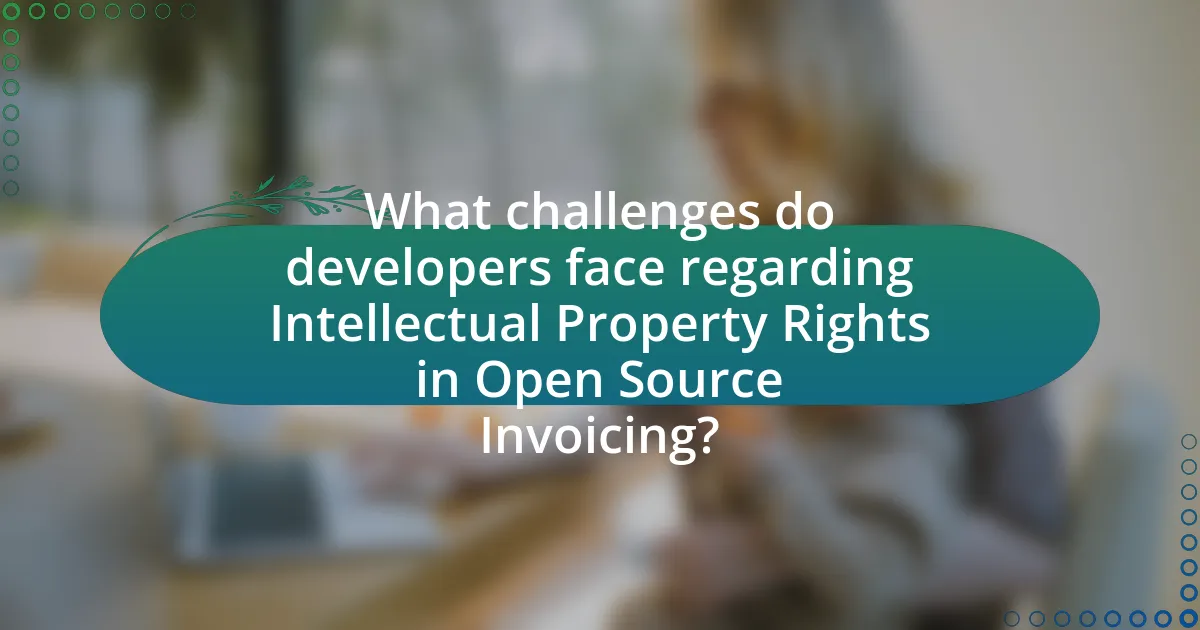
What challenges do developers face regarding Intellectual Property Rights in Open Source Invoicing?
Developers face significant challenges regarding Intellectual Property Rights (IPR) in Open Source Invoicing, primarily due to the ambiguity surrounding licensing agreements. Many open-source licenses, such as the GNU General Public License (GPL) and the MIT License, have different stipulations that can lead to confusion about ownership and usage rights. For instance, the GPL requires derivative works to also be open source, which can conflict with proprietary interests of developers. Additionally, developers may inadvertently infringe on existing patents or copyrights when integrating third-party open-source components, as the lack of comprehensive documentation can obscure the original source of code. This complexity is compounded by the evolving legal landscape surrounding software patents, which can create uncertainty about the enforceability of IPR claims in open-source contexts.
What common misconceptions exist about Intellectual Property Rights in open source?
Common misconceptions about Intellectual Property Rights in open source include the belief that open source software is free of any legal restrictions and that using open source code means relinquishing all rights to one’s own modifications. In reality, open source licenses impose specific conditions that must be followed, such as attribution and sharing modifications under the same license. For instance, the GNU General Public License requires that any derivative work also be open-sourced under the same terms, which contradicts the notion that developers can do anything they want with the code. Additionally, many assume that open source software is devoid of copyright protection; however, copyright law still applies, and the original authors retain their rights unless explicitly waived.
How can these misconceptions lead to legal issues?
Misconceptions about intellectual property rights in open source invoicing can lead to significant legal issues, such as copyright infringement and breach of licensing agreements. For instance, if a developer mistakenly believes that open source software can be freely modified and redistributed without adhering to the original license terms, they may unintentionally violate those terms, resulting in legal action from the original copyright holder. According to a study by the Open Source Initiative, 60% of companies using open source software reported legal challenges related to licensing misunderstandings, highlighting the importance of proper compliance with intellectual property laws.
What steps can developers take to educate themselves and others?
Developers can educate themselves and others about intellectual property rights in open source invoicing by engaging in structured learning and sharing knowledge. They should start by studying relevant legal frameworks, such as copyright and licensing agreements, which govern open source software. Online courses and webinars from reputable organizations, like the Open Source Initiative, provide valuable insights into these topics.
Additionally, developers can participate in community forums and discussions, such as those on GitHub or Stack Overflow, to exchange ideas and clarify doubts regarding intellectual property. Writing articles or blog posts about their learnings can further solidify their understanding while helping others in the community.
Attending conferences and workshops focused on open source and intellectual property can also enhance their knowledge and provide networking opportunities with experts in the field. These steps collectively contribute to a well-rounded education on intellectual property rights in open source invoicing.
How do international laws affect Intellectual Property Rights in open source invoicing?
International laws significantly influence Intellectual Property Rights (IPR) in open source invoicing by establishing a framework that governs the use, distribution, and modification of open source software. These laws, such as the Agreement on Trade-Related Aspects of Intellectual Property Rights (TRIPS), set minimum standards for IPR protection that member countries must adhere to, impacting how open source licenses are interpreted and enforced globally. For instance, TRIPS mandates that countries provide protection for software as a form of intellectual property, which can affect the legal standing of open source licenses like the GNU General Public License (GPL) or the MIT License. Consequently, compliance with international laws ensures that open source projects can operate within a legally recognized framework, promoting innovation while safeguarding the rights of developers and users.
What variations exist in Intellectual Property Rights across different countries?
Intellectual Property Rights (IPR) vary significantly across countries due to differences in legal frameworks, enforcement mechanisms, and cultural attitudes towards innovation and creativity. For instance, the United States emphasizes strong patent protections and has a robust enforcement system, while European countries often prioritize copyright and moral rights, reflecting a more collective approach to authorship. In contrast, developing nations may have weaker enforcement of IPR, leading to challenges in protecting intellectual property. According to the World Intellectual Property Organization (WIPO), countries like India and Brazil have adapted their IPR laws to balance protection with access to knowledge, particularly in pharmaceuticals. These variations impact how open source projects are managed and protected globally, influencing collaboration and innovation in the field.
How can developers protect their rights globally?
Developers can protect their rights globally by utilizing intellectual property laws, such as copyright, trademarks, and patents, to secure their creations. Copyright automatically protects original works, including software code, while trademarks safeguard brand names and logos. Patents can be applied for innovative technologies, granting exclusive rights for a specified period. Additionally, developers should consider licensing their work under open-source licenses that clearly define usage rights and restrictions, ensuring that their contributions are recognized and protected. According to the World Intellectual Property Organization, effective use of these legal frameworks can significantly enhance a developer’s ability to maintain control over their intellectual property on an international scale.
What practical tips can developers follow to navigate Intellectual Property Rights in Open Source Invoicing?
Developers can navigate Intellectual Property Rights in Open Source Invoicing by thoroughly understanding the licenses associated with the open source software they use. Each license, such as MIT, GPL, or Apache, has specific requirements regarding usage, modification, and distribution. For instance, the GPL license mandates that any derivative work must also be open source, ensuring that developers comply with these terms to avoid legal issues. Additionally, developers should document their contributions and any modifications made to the open source code, as this can provide clarity on ownership and rights. Engaging with the open source community through forums and discussions can also help clarify any uncertainties regarding IP rights. Lastly, consulting with legal professionals who specialize in intellectual property can provide tailored guidance and ensure compliance with relevant laws.
How can developers effectively document their work and rights?
Developers can effectively document their work and rights by maintaining clear and comprehensive records of their contributions, including code comments, version control logs, and formal agreements. This practice ensures that all aspects of their work are traceable and legally recognized, which is crucial for asserting intellectual property rights. For instance, using platforms like GitHub allows developers to track changes and contributions, providing a transparent history that can serve as evidence in disputes. Additionally, formalizing rights through licenses, such as the MIT License or GNU General Public License, clarifies the terms under which their work can be used, thereby protecting their intellectual property.
What resources are available for ongoing education and support?
Resources available for ongoing education and support in the context of Intellectual Property Rights in Open Source Invoicing include online courses, webinars, and professional organizations. Online platforms like Coursera and edX offer courses specifically focused on intellectual property and open source licensing, providing structured learning paths. Webinars hosted by organizations such as the Open Source Initiative and the Electronic Frontier Foundation offer insights from experts in the field. Additionally, professional organizations like the American Intellectual Property Law Association provide resources, networking opportunities, and access to publications that support ongoing education and advocacy in intellectual property rights.
